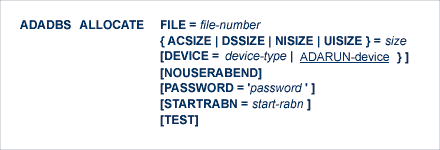The ALLOCATE function may be used to allocate an address converter, Data Storage, normal or upper index extent of a specific size. Only one extent may be allocated per ADADBS execution.

This document covers the following topics:
FILE specifies the number of the file for which the extent is to be allocated.
These parameters are used to indicate the type and size of the extent to be allocated. One and only one extent type and size can be specified in a single ADADBS ALLOCATE statement. The specified value can be either cylinders or blocks; a size in blocks must be followed by "B" (for example, 2000B).
Note:
Adabas will detect if an attempt is made to allocate the Address
Converter size (ACSIZE) beyond the database setting for MAXISN. If this occurs,
Adabas will only allocate the ACSIZE up to the MAXISN size.
The device type to be used for file allocation. This parameter is required only if a different device type from the device type specified by the ADARUN DEVICE parameter is to be used.
When an error is encountered while the function is running, the utility prints an error message and terminates with user abend 34 (with a dump) or user abend 35 (without a dump).
If NOUSERABEND is specified, the utility will not abend after printing the error message. Instead, the message "utility TERMINATED DUE TO ERROR CONDITION" is displayed and the utility terminates with condition code 20.
The password of the file. This parameter is required if the file is password-protected.
The beginning RABN of the extent to be allocated. If this parameter is omitted, ADADBS will assign the starting RABN.
The TEST parameter tests the operation syntax without actually performing the operation. Only the syntax of the specified parameters can be tested; not the validity of values and variables. See Syntax Checking with the TEST Parameter for more information on using the TEST parameter in ADADBS functions.
An address converter extent of 30 blocks is to be allocated for file 15.
ADADBS ALLOCATE FILE=15,ACSIZE=30B